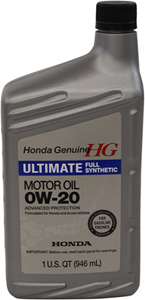Synthetic vs. Conventional Oil for Acura Vehicles

For Acura owners, choosing the right type of oil is not just a matter of routine maintenance but a critical decision that affects the longevity and performance of their vehicle. This guide explores the differences between synthetic and conventional oils to help you make an informed decision tailored to your vehicle's needs.
Introduction to Oil Type: Overview of Synthetic, Synthetic Blend, and Conventional Oil
Oil serves as the lifeblood of your vehicle's engine. Each type of oil—synthetic, synthetic blend, and conventional—offers unique advantages depending on its formulation:
- Synthetic Oil: Engineered from chemically modified petroleum or other raw materials, synthetic oil provides superior performance under extreme conditions, offering enhanced engine protection and efficiency.
- Synthetic Blend Oil: This oil combines the best features of synthetic and conventional oils, offering a balance of performance and cost-effectiveness.
- Conventional Oil: Suitable for older vehicle models or less demanding engine requirements, conventional oil is adequate for standard driving conditions, though it requires more frequent changes.
Importance of Choosing the Right Oil for Acura

Selecting the correct oil type is critical not just for maintenance but for ensuring your Acura's engine operates efficiently. Using the right oil enhances performance, extends the engine’s lifespan, and can significantly impact overall vehicle health.
Benefits of Synthetic Oil
Synthetic oils are recommended for Acura vehicles due to their ability to enhance engine performance and protect against wear and tear. Benefits include:
- Enhanced Engine Performance and Protection: Synthetic oil's advanced lubrication properties reduce friction, allowing the engine to run smoother and more efficiently.
- Improved Fuel Efficiency and Flow in Cold Temperatures: With a lower viscosity at cold temperatures, synthetic oil ensures the engine starts easily and runs smoothly, even in severe cold.
- Extended Oil Change Intervals: Thanks to its chemical stability, synthetic oil breaks down slower than conventional oil, allowing for longer intervals between oil changes.
- Resistance to Oxidation and Chemical Breakdown: Synthetic oil withstands extreme temperatures without oxidizing or breaking down, maintaining its protective qualities longer than conventional oils.
Comparisons and Considerations

Synthetic vs. Conventional Oil
The choice between synthetic and conventional oil often depends on vehicle requirements and operating conditions. Synthetic oil, with its superior properties, supports enhanced engine performance and longevity, particularly suitable for modern Acura engines.
Full Synthetic vs. Synthetic Blend
Full synthetic oil offers the highest level of protection and efficiency, ideal for high-performance or newer engine models. Synthetic blends are more cost-effective and suitable for moderate driving conditions.
Impact on Engine Longevity and Maintenance
Synthetic oils contribute to longer engine life and reduced maintenance by protecting engine components from wear and high temperatures, especially in challenging driving conditions.
Acura Motor Oil Recommendations and Practices
Acura often recommends synthetic oils for their vehicles to optimize engine performance and durability. The use of synthetic blend or full synthetic oil depends on the specific model and its engine requirements. Acura advises using oil that meets or exceeds specific manufacturer standards to ensure optimal performance and vehicle longevity. This typically includes high-quality synthetic oils that provide excellent protection and efficiency.
Consumer Shift Towards Synthetic Oil Usage
Increasingly, Acura owners and automotive consumers are choosing synthetic oil due to its long-term benefits for engine health and performance. Market analysis indicates a significant trend towards synthetic oil, driven by its superior quality and the growing awareness of its advantages over conventional oil. Market research and consumer reports suggest a strong preference for synthetic oil among Acura owners, highlighting its effectiveness in extending engine life and reducing maintenance costs.
DIY Oil Change Tips
Choosing the right oil for your Acura requires understanding the differences between synthetic and conventional oils and assessing your vehicle's specific needs. Synthetic oil, made from chemical compounds, excels in engine protection and efficiency. It functions well in both extreme heat and cold, maintaining consistency to prevent wear and tear, reduce sludge, and extend oil change intervals.
Conventional oil, derived from crude oil, suits older car models and offers a cost-effective solution but necessitates more frequent changes to maintain engine health. It may also falter under extreme temperatures and severe driving conditions.
Your Acura's owner manual details specific oil recommendations, particularly for newer or high-performance models which typically require synthetic oil to handle higher temperatures and comply with warranty conditions.
Consider your typical driving conditions—such as frequent short trips, extended idling, or heavy towing—as these can demand more from oil, making synthetics a better choice due to their durability and superior performance.
Finally, ensure the oil meets Acura's specified viscosity grades and industry certifications like API or ILSAC, which confirm the oil adheres to essential performance standards and provides sufficient engine protection.
By understanding the differences between synthetic and conventional oils and following Acura's recommendations, you can maintain your vehicle’s engine in optimal condition, ensuring it runs efficiently and lasts longer.
Related Articles